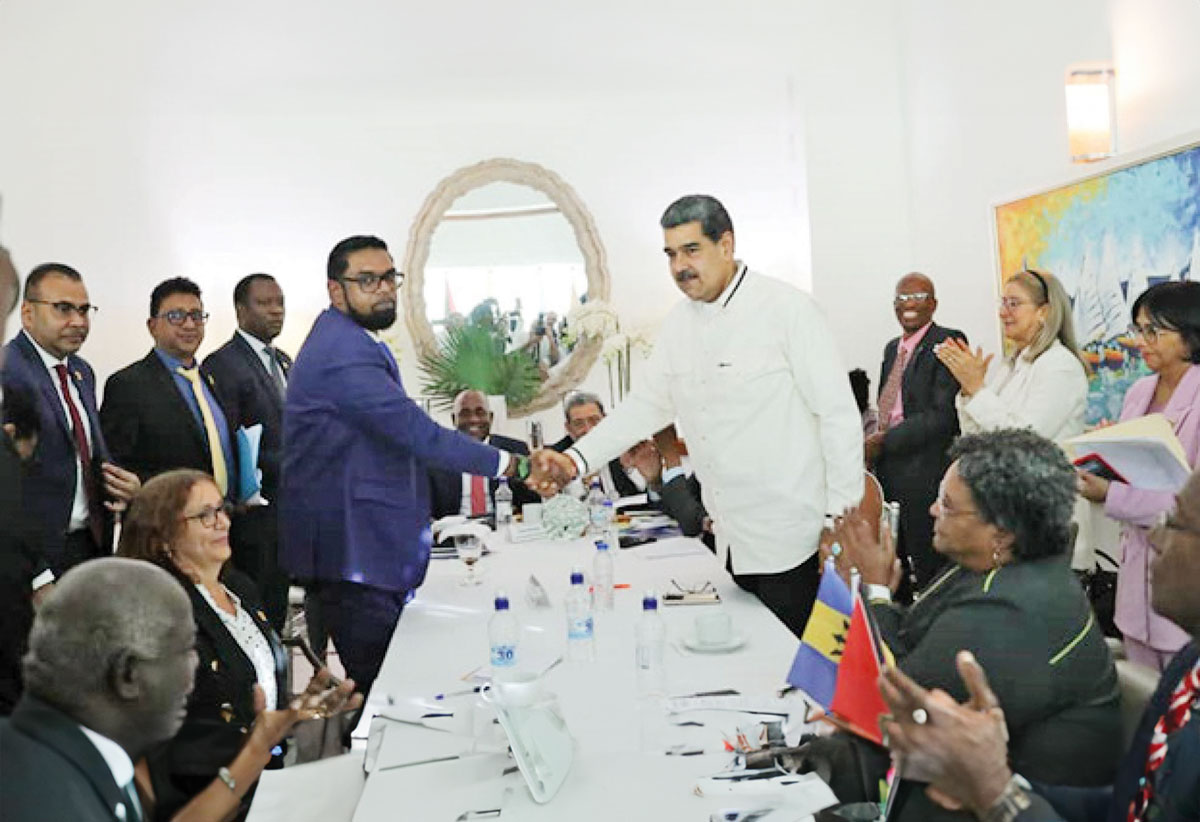
ARGYLE, St Vincent & The Grenadines: In a rare triumph for Caribbean and Latin American diplomacy, the Caribbean Community (CARICOM) and the Community of Latin American and Caribbean States (CELAC) on Thursday (December 14) helped put a pause on the possible explosion of the Guyana-Venezuela border controversy into more than a war of words.
CARICOM and CELAC, through Vincentian Prime Minister Dr Ralph Gonsalves, met and shook hands for the first time since the latest spat over the 124-year-old Venezuela claim to Guyana’s Essequibo region – and agreed to replace war talk with peaceful measures.
With Saint Lucia’s Prime Minister Philip J. Pierre and other CARICOM leaders present, Guyana’s President Dr Irfaan Ali and Venezuelan President Nicolas Maduro sat through ten hours of meetings at the Argyle Airport conference center, to discuss how best to lower tensions and build steps to talk peace and neighbourly cooperation.
Before the meeting, tensions were high. The two sides were trading words of war, Venezuela redrew its map to include two-thirds of Guyana and Guyana sought support of allies and friends capable of assisting it in defense against any attack.
But thanks to the shuttle diplomacy conducted by PM Gonsalves, in coordination with Brazilian President Luiz Ignacio ‘Lula’ Ds Silva and CARICOM Chairman Dominica Prime Minister Roosevelt Skerrit, the two feuding sides came to the table to talk peace.
With the international and regional press attending in record numbers, the meeting concluded with the two sides agreeing to continue to disagree on the major issues of the Venezuelan claim and the involvement of the United Nations (UN) and its International Court of Justice (ICJ), but they agreed to lower the volume of their cross-border quarrels, set a timetable for follow-up meetings and do nothing to further escalate the conflict.
The meeting was welcomed by Venezuela’s President Maduro as “a triumph for democracy peace” and the Guyana delegation, on returning home, also expressed pleasure that matters relating to the ICJ were not discussed, being still before the World Court.
Dr Gonsalves expressed pleasure that “All parties attending the meeting reiterated their commitment to Latin America and the Caribbean remaining a Zone of Peace.”
Meanwhile, throughout yesterday, Caribbean, Latin American and international political analysts were assessing the outcomes with differing conclusions, most saying it was a useful meeting that lowered tensions and preserved regional peace, but others arguing it didn’t go far or fast enough.
Presidential elections are due in Venezuela next year and Guyana the year after, so some also concluded it was all “political theater” for national voting audiences, but others felt any de-escalation of a conflict that had the region worried about a possible war between two neighbors, should always be welcomed.
Opinions continue to differ, but Saint Lucia and the Caribbean are breathing a heavy sigh of relief, after waiting several weeks to exhale.
The next round of talks will take place in Brazil. (Full text of Declaration here)





![Attendees at the UHC logo and website launch [Photo credit: GOSL]](https://thevoiceslu.com/wp-content/uploads/2026/02/Attendees-at-the-UHC-logo-and-website-launch-380x250.jpg)






![Remnants of an alleged drug boat blown up in a lethal strike by the U.S. military last week surfaced off Canouan on Saturday [Photo credit : St Vincent Times]](https://thevoiceslu.com/wp-content/uploads/2026/02/Remnants-of-an-alleged-drug-boat-blown-up-380x250.jpg)
